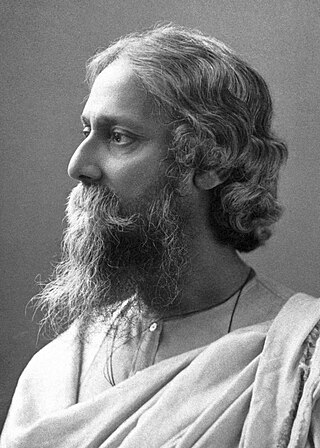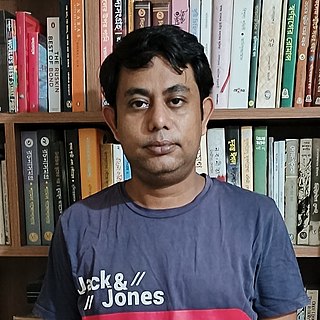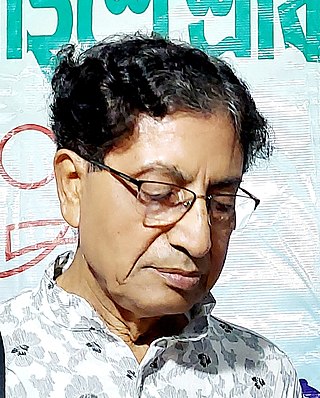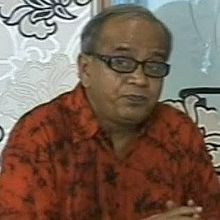
Bankim Chandra Chattopadhyay was an Indian Bengali novelist, poet, essayist and journalist. He was the author of the 1882 Bengali language novel Anandamath, which is one of the landmarks of modern Bengali and Indian literature. He was the composer of Vande Mataram, written in highly Sanskritised Bengali, personifying India as a mother goddess and inspiring activists during the Indian Independence Movement. Chattopadhayay wrote fourteen novels and many serious, serio-comic, satirical, scientific and critical treatises in Bengali. He is known as Sahitya Samrat in Bengali.

Sunil Gangopadhyay or Sunil Ganguly was an Indian poet, novelist, short story writer, and critic in the Bengali language. He was one of the foremost poets experimenting with new forms, themes, rhythms, and words in Bengali poetry in the 1950s and 1960s. In 1953, along with Deepak Majumder and Ananda Bagchi, he founded the Bengali poetry magazine, Krittibas. He is regarded as one of the most prolific and popular writers in Bengali since Rabindranath Tagore.

Sankha Ghosh was an Indian poet and literary critic. He was born in Chandpur District of the then Bengal Presidency, present day Bangladesh. His ancestral home was at Banaripara Upazila in Barisal District. He spent his childhood and adolescence in Ishwardi Upazila of Pabna District, which was his father's workplace.

Bibhutibhushan Bandyopadhyay was an Indian writer in the Bengali language. His best known works are the autobiographical novel Pather Panchali, Aparajito (Undefeated), Chander Pahar and Aranyak.

Bengali literature denotes the body of writings in the Bengali language and which covers Old Bengali, Middle Bengali and Modern Bengali with the changes through the passage of time and dynastic patronization or non-patronization. Bengali has developed over the course of roughly 1,400 years. If the emergence of the Bengali literature supposes to date back to roughly 650 AD, the development of Bengali literature claims to be 1600 years old. The earliest extant work in Bengali literature is the Charyapada, a collection of Buddhist mystic songs in Old Bengali dating back to the 10th and 11th centuries. The timeline of Bengali literature is divided into three periods: ancient (650–1200), medieval (1200–1800) and modern. Medieval Bengali literature consists of various poetic genres, including Hindu religious scriptures, Islamic epics, Vaishnava texts, translations of Arabic, Persian and Sanskrit texts, and secular texts by Muslim poets. Novels were introduced in the mid-19th century. Nobel laureate Rabindranath Tagore is the best known figure of Bengali literature to the world. Kazi Nazrul Islam, notable for his activism and anti-British literature, was described as the Rebel Poet and is now recognised as the National poet of Bangladesh.

Syed Mujtaba Ali was a Bengali writer, journalist, travel enthusiast, academic, scholar and linguist. He lived in Bangladesh, India, Germany, Afghanistan and Egypt.

Peary Chand Mitra was an Indian writer, journalist, cultural activist and entrepreneur. His pseudonym was Tek Chand Thakur. He was a member of Henry Derozio's Young Bengal group, who played a leading role in the Bengal renaissance with the introduction of simple Bengali prose. His Alaler Gharer Dulal pioneered the novel in the Bengali language, leading to a tradition taken up by Bankim Chandra Chatterjee and others. Mitra died on 23 November 1883 in Kolkata.
Anil Gharai (alt., Anil Ghařāi, Anil Gharai was a Bengali writer from the state of West Bengal in India. He was born on 1 November 1957 in Rukminipur village near Egra in what is now Purba Medinipur district. His first short story was published in 1990 in Desh patrika. He was an author of 74 books.
The Ananda Puraskar is an award for Bengali literature awarded annually by the ABP Group to writers using Bengali, usually from West Bengal, India.

Sandipan Chattopadhyay was an Indian Bengali writer. His 1961 book "Kritadas Kritadasi" changed the landscape of Bengali fiction and made his name. A staunch anti-establishment figure and a supporter of creative freedom, Sandipan for some time refused association with the big Bengali publishing houses.
Nabendu Ghosh was an Indian author in Bengali literature, and screenwriter. He has written screenplays of classic Bollywood movies like, Sujata, Bandini, Devdas, Majhli Didi, Abhimaan and Teesri Kasam. He has written stories for movies like Baap Beti, Shatranj, Raja Jani. He has also acted briefly in Do Bigha Zameen, Teesri Kasam and Lukochuri. Later in his career, he directed four movies as well.
Gour Kishore Ghosh was an Indian writer and journalist in Bengali. Associated with Anandabazar Patrika for decades, Ghosh was known for his novels Desh Mati Manush and Prem Nei. He was the first editor of Aajkaal.

Manoj Mitra was an Indian theatre, film and television actor, director, and playwright.
Durgeshnandini is a Bengali historical romance novel written by Indian writer Bankim Chandra Chattopadhyay in 1865. Durgeshnandini is a story of the love triangle between Jagat Singh, a Mughal General, Tilottama, the daughter of a Bengali feudal lord and Ayesha, the daughter of a rebel Pathan leader against whom Jagat Singh was fighting. The story is set against the backdrop of Pathan-Mughal conflicts that took place in south-western region of modern-day Indian state of Paschimbanga during the reign of Akbar.
Bankim Puraskar is the highest award given by the Government of West Bengal for contribution to Bengali fiction. The award was instituted in 1975 in memory of Bankim Chandra Chattopadhyay, a famous Bengali novelist of the 19th century. It has been brought under the aegis of Paschimbanga Bangla Akademi, functioning under the Department of Information & Cultural Affairs, in 2003. The award is handed over by the Chief Minister of West Bengal.

Anita Agnihotri is an Indian Bengali writer and poet. Her works have been translated into several major Indian and foreign languages, including English, Swedish and German. She is also a retired civil servant.

Ramapada Chowdhury was a Bengali-language novelist and short story writer in India. For his novel Bari Badle Jay, he received the Sahitya Akademi Award in 1988. He was also a recipient of the Rabindra Puraskar and several other awards. He won the Rabindranath Tagore Memorial International Prize in its inaugural year. Many of his works have been adapted into films, including the multiple-award-winning Kharij, directed by Mrinal Sen, and Ek Doctor Ki Maut, directed by Tapan Sinha. Chowdhury started writing during the Second World War. He was associated with Anandabazar Patrika for many years, and edited its Sunday supplement. His novels are marked by an economy of expression. He is one of the most well known short story writers in contemporary Bengali literature.

Shamik Ghosh is an Indian author writing in Bengali. He has won the prestigious Sahitya Akademi Yuva Puraskar in 2017 in Bengali for his debut short story collection "Elvis O Amolasundari" His shorty 'Half Timer Pawre' from the collection was selected by Hervill Secker, an imprint of Vintage, Penguin Random House, U.K for the Harvill Secker Young Translators’ Prize 2018. The story was published in Granta online He has been awarded the Ila Chanda Smriti Puraskar by the oldest literary Institution of India, Bangiya Sahitya Parishad. and Somen Chanda Smriti Smarok by West Bengal Bengali Academy in 2019.

Tapan Bandyopadhyay is an eminent Bengali novelist. He won the Sahitya Akademi Award in 2022 for his novel Birbal.













